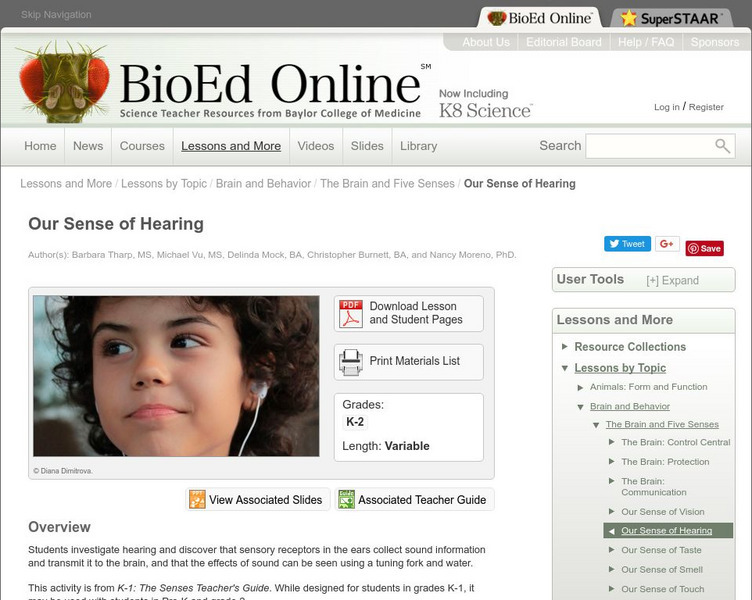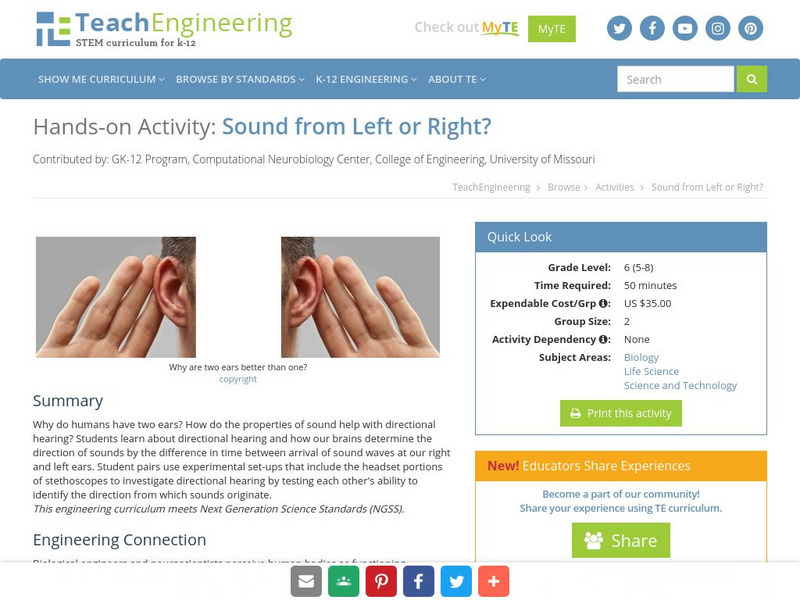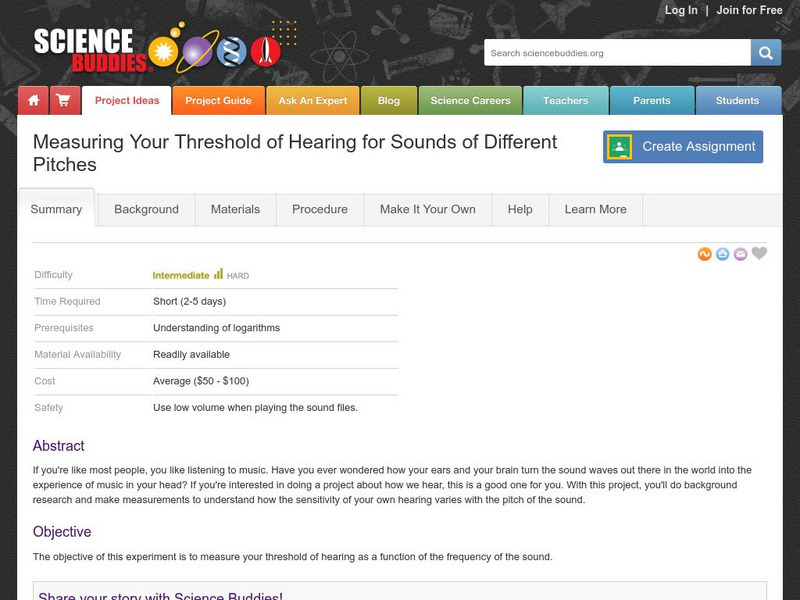Hi, what do you want to do?
Texas Education Agency
Texas Gateway: Physics of Hearing: Sound Intensity and Sound Level
By the end of this section, you will be able to define intensity, sound intensity, and sound pressure level and to calculate sound intensity levels in decibels (dB).
CK-12 Foundation
Ck 12: Life Science: Hearing and Balance
[Free Registration/Login may be required to access all resource tools.] What do listening to music and riding a bike have in common? It might surprise you to learn that both activities depend on your ears. The ears do more than just...
BioEd Online
Bio Ed Online: Our Sense of Hearing
What causes sound? How do our ears detect sound? How do our brains recognize sound? In this lesson students investigate hearing and discover that sensory receptors in the ears collect sound information and transmit it to the brain, and...
CK-12 Foundation
Ck 12: Physical Science: Hearing and the Ear
[Free Registration/Login may be required to access all resource tools.] Explains how we hear sound, how the ear works, and the different structures of the ear.
Texas Education Agency
Texas Gateway: Physics of Hearing: Hearing
By the end of this section, you will be able to define hearing, pitch, loudness, timbre, note, tone, phon, ultrasound, and infrasound; compare loudness to frequency and intensity of a sound; and identify structures of the inner ear and...
Georgia State University
Georgia State University: Hyper Physics: Sound Level Measurement
Home page for a hypertext physics course. Users can access subjects ranging from the sound wave parameters that effect hearing and communication to OSHA worplace standards.
TeachEngineering
Teach Engineering: Sound From Left or Right?
Why do humans have two ears? How do the properties of sound help with directional hearing? Students learn about directional hearing and how our brains determine the direction of sounds by the difference in time between arrival of sound...
Unite for Literacy
Unite for Literacy: Healthy Me: I Hear
Look at all the things a child can hear and listen to each day. Book includes audio narration in 19 additional languages with text in English.
Alabama Learning Exchange
Alex: Do You Hear What I Hear?
Learners will perform an investigative activity in which they will identify sounds. The teacher will play several different sounds through the computer and sound system. Students will listen and act as "detectives" to relate sounds to...
Texas Education Agency
Texas Gateway: Physics of Hearing: Conceptual Questions
This is a list of 15 questions based on the major concepts presented in Chapter 17: Physics of Hearing from the AP Physics online text.
Texas Education Agency
Texas Gateway: Physics of Hearing: Problems and Exercises
This is a list of 84 problems and exercises to solve based on the content of Chapter 17: Physics of Hearing from the AP Physics online text.
Ducksters
Ducksters: Biology for Kids: Hearing and the Ear
Kids learn about the science of hearing and the ear. A sense that detects sound.
TeachEngineering
Teach Engineering: How Does a Sound Sensor Work?
Students learn about how sound sensors work, reinforcing their similarities to the human sense of hearing. This lesson and its associated activity enable students to appreciate how robots can take sensor input and use it to make...
National Institutes of Health
Nidcd: Noise Induced Hearing Loss
This site on Noise-Induced Hearing Loss runs through a variety of topics on the subject and includes a diagram. The topics covered include: How do we hear, What sounds cause NIHL, What are the effects of NIHL, Can NIHL be prevented, What...
Texas Education Agency
Texas Gateway: Physics of Hearing: Sound
describe sound as a longitudinal wave.By the end of this section, you will be able to define sound and hearing and
Georgia State University
Georgia State University: Hyper Physics: Sound and Hearing
Home page for a hypertext course on physics. Accesses a range of topics from hearing to sound measurement to sound propoation to musical instruments.
Science Buddies
Science Buddies: Measuring Your Threshold of Hearing
How your ears and your brain turn the sound waves out there in the world into the experience of music in your head, remains a mystery to many, but yet we all experience and even enjoy sounds and music. If you're interested in doing a...
Texas Education Agency
Texas Gateway: Physics of Hearing: Speed of Sound, Frequency, and Wavelength
By the end of this section, you will be able to define pitch; describe the relationship between the speed of sound, its frequency, and its wavelength; describe the effects on the speed of sound as it travels through various media; and...
University of Colorado
University of Colorado: Ph Et Interactive Simulations: Sound
This simulation lets you see sound waves. Adjust the frequency or volume and you can see and hear how the wave changes. Move the listener around and hear what she hears.
PBS
Pbs Learning Media: Moriussaq: A Case Study in Hearing Loss
This video segment follows neurophysiologist Allen Counter as he studies an epidemic of hearing loss in Moriussaq, Greenland, one of the quietest places on Earth. Footage from NOVA: "Mystery of the Senses: Hearing."
Texas Education Agency
Texas Gateway: Sound Interference and Resonance: Standing Waves in Air Columns
By the end of this section, you will be able to define antinode, node, fundamental, overtones, and harmonics; identify instances of sound interference in everyday situations; describe how sound interference occurring inside open and...
National Science Foundation
National Science Foundation: Language and Linguistics
The language we use everyday reveals a great deal about who we are and where we come from. However, did you know that language is linked to psychology, biology, and other sciences? Explore the "science" of language: how the brain...
Read Works
Read Works: Now Hear This
[Free Registration/Login Required] An informational text about high-pitch sounds that can be heard by children but not by adults. A question sheet is available to help students build skills in understanding cause and effect.
PBS
Pbs Teachers: Scientific American: Calls of the Wild: Flies and Stereo
Explore the characteristics of binaural hearing and discover how two ears are utilized in determining the direction of a sound's origin. Produce auditory illusions by reversing and extending the detection site for each ear.
Other popular searches
- Sound and Hearing
- Science Sound and Hearing
- Hearing and Sound Experiment
- Sound and Hearing Worksheets




























